An interview with Steffen
Wesemann
Getting back in the pink
By Kathie Stove
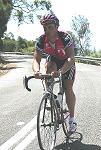 |
Photo: © Marcus Brownlow
Steffen Wesemann
Born: March 11, 1971 in Wolmirstedt
Nationality: German
Residence: Kuettigen (Switzerland)
Height: 1.73m
Weight: 72kg
Marital status: Married
Professional since: 1993
Teams: Telekom (since 1993)
Selected palmares
2001
3rd Ghent-Wevelgem
7th Paris-Roubaix
2000
1st stage Tour Down Under
9th Ghent-Wevelgem
9th Paris-Roubaix
1st Tour round Cologne
1st GP Gippingen
1st 2 stages Peace Race
1999
1st Peace Race
1st 4 stages Peace Race
1997
1st Peace Race
2nd GP William Tell
1996
1st Peace Race
1st stage Tour Rhineland-Pfalz
1995
1st sprint classification Vuelta a Espa–a
1993
1st stage Setmana Catalana
1st stage Tour de l'Avenir
1992
1st Peace Race
|
In what has become an annual sojourn, Team Telekom rider Steffen Wesemann
has spent December, with wife Caroline and daughter Svena, in Adelaide training
for the Tour Down Under and the season ahead. Under the guidance of his coach,
Thomas Schediwie, Steffen has been riding around the Adelaide Hills on roads
he would now know better than most locals.
Steffen was part of the Telekom team that came to the first Tour Down Under
in 1999 and he liked what he saw.
"You have to train in December anywhere and in Switzerland it's impossible,"
Steffen said.
"A lot of the riders go to South Africa. Before we would go to California;
there were four or five riders for four or five years. Then the Tour Down Under
started and I don't like too much travelling so if you travel to South Africa
and then go home for Christmas and then come here you lose two or three days
in the plane. So we, the family, thought why not come for Christmas and New
Year to South Australia. We started a friendship with David MacFarlane who organised
the Tour Down Under the first and second time, and everything here was organised
so well.
"So now we feel like it's a second home here with the family. We have thought
about buying a house here but it's too far away. I like to be here. We have
friends here now and we know where everything is. It's a very nice area for
training. This year it's a bit cold but you can train anyway. Last year it was
very hot and this year I didn't bring warm clothes with me. I like it hot."
| |
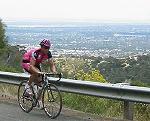 |
Training
above Adelaide
Photo: © Marcus Brownlow
|
On paper the Telekom team for TDU 2002 appears to be a strong one but Steffen
said that the European riders have the disadvantage of being at the start of
their season.
"From the names yes it's strong: Kloeden, Heppner, Hondo, Julich, Bartko, but
we have different training so I don't know what their condition is like," Steffen
said.
"The European riders do a lot of base training now and the Australian riders
are racing in National Championships and a lot of races. It's a different season.
It makes a lot of difference having raced three or four long races and a few
criteriums; it puts you in totally different condition for attack and so on.
We can't go into our first race and attack and attack, it's not possible. But
with every race you get better and better."
The Telekom team also includes the neo-professional David Kopp who is an exciting
prospect.
"Yes but it's a big step over to the professionals. It's a totally different
race from amateurs to professionals. They think OK I can go with them but then
they have their first races. I've seen young riders sleeping in their race clothes
totally exhausted."
Being originally East German Steffen benefited from the political drive to
have the country succeed at Olympic sports but the reason he chose cycling was
more personal. "It's a family problem. My father's a rider too. He went to the
Olympic Games in 1968 and 1972, Mexico and Munich. So cycling has a history
in my family. I started to play soccer and sometimes I watched bike riding,
the Friendship [Peace] Race, every East German race and if it's possible the
Tour de France, and I said OK I want to start cycling.
Though they were cut off from most European racing, contesting the Peace Race
-- the 'Tour de France of the East' that takes in Poland, Czechoslovakia and
Germany -- was an inspiration to many Eastern riders and it is the race at which
Steffen has had the most success, winning it four times.
| |
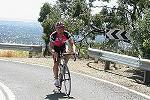 |
More
hill reps
Photo: © Marcus Brownlow
|
"My father came second in the prologue one year. So it was important for me
to start in it. In 1992 I won it the first time as an amateur and then I won
it three times more as a professional. When I started cycling I wanted to beat
my father, so I think that's happened."
Steffen's entire professional career has been spent with Telekom and he said
that he is happy there.
"Every team has problems some time but everything is very well organised, the
staff, the bikes, everything is perfect. The money comes at the end of the month,
every month, and in every team it is not always so, you know the stories of
Linda McCartney and Mercury this year. Telekom is a big company and so you are
sure to get your money. That's important, especially if you have a family."
The 220km that Steffen had ridden the day before we spoke ("It's a long way
even for me") is a good indication of his determination to put a less than successful
2001 behind him. His standards are high as his record shows.
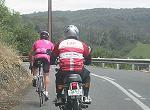 |
Coach
Thomas keeps pace
Photo: © Marcus Brownlow
|
|
"In my first year as a professional I won two stages in stage races, one in
the Setmana Catalana and one in the Tour de l'Avenir. And every year small victories,
maybe one or two years without. And this year I didn't win a race. My best year
was 2000: I won Tour of Cologne, GP Gippingen and I had a lot of good results
in Paris-Roubaix, in Flanders.
"But this year I was very late with my condition because I broke my collarbone
in the Tour de France in 2000 and had two operations. So then I started my training
later and came into very good condition very late, just for Flanders and Ghent-Wevelgem."
Then came Paris-Roubaix where Steffen rode to an inspiring seventh place, the
last of the lead group. True, everyone had to deal with the appalling conditions
and spare wheels were in constant demand. But a broken cleat meant that Steffen
could not lock onto one pedal and virtually rode on one leg for about 70 km,
falling behind on each cobbled section and then catching the leaders again on
the bitumen. I couldn't help but ask why, with the added problem of four Domo
riders in the lead group, he didn't pack it in.
| |
 |
Paris-Roubaix
Photo: © Cyclingnews
|
"I trained very hard and wanted to be in the race when it came to the finish
and I had two situations: I could stop the race or I could fight and I thought
OK I fight. You don't know what is going to happen. There were the four Domos
and that was a bad situation but you never know what happens in Paris-Roubaix.
Maybe one of them gets a puncture or a chain breaks and then there are three;
maybe one runs out of condition and then there's just two and it's better. But
when you start in Paris-Roubaix you are sure that Domo is a very, very strong
team."
The effort cost him dearly: the severely inflamed tendon caused by the one-sided
riding kept him out of training.
"I had to have a break of three weeks. And in the middle of the season having
three weeks out I was totally out of condition. I came back in the Midi Libre,
just for training; I didn't do the last stage. But I did the Tour of Germany
and I wasn't so good but did my work for the team. In the Tour of Switzerland
I did much better. So then I was nominated for the Tour de France and did a
lot of training rides."
Steffen explained the disappointing team time trial result for Telekom in terms
of team tactics.
"Guerini and Livingston are not so good time triallers so we started a little
bit slow, I think, and after we set up maybe we can go a little bit faster.
But you never know, if you start slow you never get your rhythm so you don't
come back. If you start faster maybe you lose two of the main guys for the hills.
So it's a compromise."
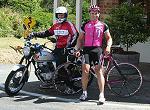 |
A
well-earned rest
Photo: © Marcus Brownlow
|
|
Steffen said that he felt good in the Tour. He survived Stage 10 -- on the
Madelaine he had two flat tyres, an incorrectly replaced rear wheel and damaged
brake pads, lost touch with the front group, and then suffered the indignity
of having to carry his own wet weather gear in a bag over his shoulder towards
the summit (on a beautifully sunny day) -- only to withdraw in Stage 13.
"I got stomach problems, a bacterial problem, you can't eat, you can't sleep,
you can drink nothing. And then one of the hardest stages in the Pyrenees. So
then I think 'times up' and get off my bike after 45 minutes. With a team like
Telekom, with Ullrich and Zabel -- to not be with them in Paris it's not so
good."
After his never-say-die effort in his personal 'hell of the north', you just
know that he had to have been a very sick boy.
For 2002, Steffen plans to spend time in Spain after he leaves Australia, contesting
the Mallorca Challenge and Ruta del Sol. Then, with any luck, be back in the
pink for a much more successful spring and summer campaign than the last.
Other Talking
Cycling Interviews





